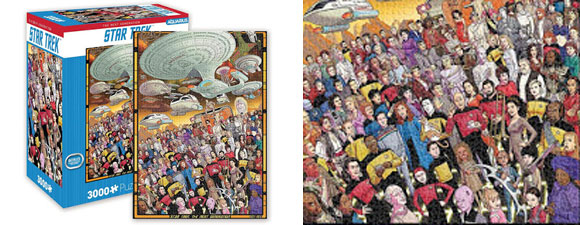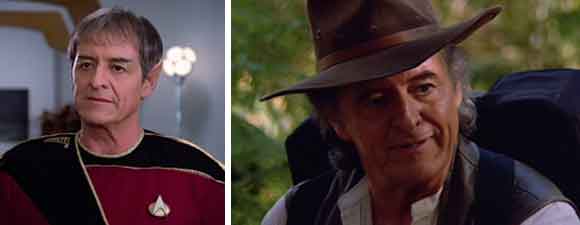Retro Review: Dark Page
7 min readLwaxana Troi collapses from repressing a secret that Deanna must use telepathy to uncover.
Plot Summary: The Enterprise hosts a diplomatic mission with the Cairn, a telepathic species being educated in the use of spoken language by Ambassador Lwaxana Troi – who is also trying to arrange a marriage between her daughter and Cairn leader Maques. Deanna is initially outraged, but her quarrels with her mother seem to trigger headaches and emotional distress for Lwaxana. Maques warns Deanna that her mother seems to have a hidden, dark area in her psyche, which Deanna dismisses at first as a normal need for privacy. Crusher advises Lwaxana to avoid using telepathy, since she has depleted her neurotransmitters, but Lwaxana makes psychic contact with Maques during a tour of the arboretum, then collapses while everyone is distracted by Maques’ young daughter Hedril, who has stumbled into the pond. Maques believes that Lwaxana’s meta-conscious mind has collapsed inward and believes that only telepathy can reach her, but he doesn’t know her well enough to interpret the images he can access in her mind. Deanna volunteers to try to reach her mother, entering her mother’s thoughts and finding herself on a duplicate of the Enterprise where first Picard orders her to leave, then a wolf chases her down a corridor, trapping her in an unknown house where she sees her dead father. Turning her back on him, Deanna is surprised to see Hedril in the vision, particularly when a furious Lwaxana appears and orders Deanna to leave the girl alone. Waking, Deanna talks to Hedril, who has had no traumatic contact with Lwaxana but says that she knows she makes Lwaxana sad. Deanna searches her mother’s journals for clues and is interrupted by Picard, who notices that seven years’ worth of entries were deleted from before Deanna’s birth until many months afterward. Entering her mother’s mind again, Deanna finds herself in the arboretum which now seems to border the house where she saw her father. Hedril is there, but she has the black eyes of a Betazoid child, and her mother calls her Kestra. As Deanna watches, she discovers that Kestra was her older sister, who drowned while their parents were distracted by the infant Deanna…an accident for which Lwaxana has always blamed herself. Deanna encourages her mother to say goodbye to Kestra, which enables Lwaxana to awaken and finally to talk about the child she lost.
Analysis: I haven’t seen “Dark Page” since it first aired in the 1990s, and had remembered it as somewhat overblown and manipulative – I thought the acting was good, but I hate insipid sentiment, so movies like Terms of Endearment and Beaches generally make me roll my eyes rather than work on me as tear-jerkers. Imagine my surprise when I story I remembered quite well, which had no surprises to offer me in terms of its drama, proved to be gut-wrenching upon rewatching. I’m sure that part of the feeling is because Majel Barrett Roddenberry died so recently; she didn’t just play Troi’s mother, she played the mother of all of Star Trek, a loss for every one of us who’s a fan. I was also a very new mother when I first saw the episode and now I have teenagers, so my sense of what’s emotionally authentic versus what’s socially constructed in terms of parental feeling has changed. I still dislike the idea that someone who’s always seemed as true to herself as Lwaxana Troi could have lived a lie for so long – on top of the question of how she got away with it, considering that she’s an empath and ambassador whose servant knew from the beginning, it’s hard to believe that someone who’s so expressive about living life to the fullest could have shut away such a big part of herself yet kept that spirit. We never had a clue that she carried such a loss when she mentored Alexander or tried to convince Timicin to keep living; if anything, despite what must have been the enormous grief of losing Deanna’s father while Deanna was still a child incapable of sharing Lwaxana’s grief because she didn’t really understand it, Lwaxana always seemed capable of carrying on, keeping the past where it belonged without having to wish it away. The woman who accompanied Timicin to his ritual suicide had no need to deceive herself about how much it would hurt her to lose him, nor that remembering their time together would make it worthwhile.
On the other hand, learning now about such a traumatic loss helps make sense of some of Lwaxana’s more erratic behavior, the sort that makes one wonder how she managed to become and stay an ambassador despite a unique penchant for embarrassing people, particularly her nearest and dearest. She’s been on Deanna’s case to find a husband since we first saw her, so her initial attempts to fix Deanna up with Maques don’t seem excessive or at all out of character. Her relentless insistence on living in the moment sometimes makes her seem reckless and childlike; it’s no wonder she gets along with Worf’s troubled son, and it’s possible to imagine that Lwaxana wants her daughter paired with Hedril’s father to keep the young Cairn girl in her life. Yet always, before “Dark Page,” we’ve been led to believe that Lwaxana’s eccentricities are calculated, that her success as a diplomat lies in her ability to catch people off their guard and spark an emotional reaction that as a telepath she can sense and cultivate. It’s not a happy thought that maybe the quirks that have served her so well – the pushy front, the loud laughter, the bawdy sense of humor – developed as a defense mechanism in the face of an unimaginable tragedy. Lwaxana’s relationship with Deanna has always had quite a bit of tension, though they clearly care deeply about one another; are we now to believe that Lwaxana deliberately held her empathic daughter at a distance to keep the sensitive Deanna from uncovering her secret?
I still feel like it’s a lot to swallow about a character we thought we knew, but it makes for a gripping storyline, and it tells us quite a bit about Deanna as well. In particular, we finally get to see her father and to hear about how his death affected her, something mentioned before only in passing. I know the writers tried to keep Troi and Riker apart because they believed romantic tension served the characters better than a love affair, but it’s always been necessary to pause and ask why they weren’t together when it seemed so apparent that they never stopped loving each other…particularly in the wake of First Contact, knowing that their romance will be revived and end in a wedding, it can seem rather arbitrary when one or the other has an intimate relationship with someone else. There’s a ring of truth in Lwaxana’s entirely inappropriate declaration that Deanna would probably be married to someone else by now if Riker didn’t have a claim on her. Deanna has expressed to his transporter clone how abandoned she felt by Will after he left for Starfleet, but her unwillingness to risk love with a Starfleet officer may go deeper, back to when she was a little girl whose father never came home. It’s a shame that we only see a child’s memory of her father – what Lwaxana expects Deanna to want to see – rather than some broader hint of who Ian Troi was, his interests and his career; we know so much about how Lwaxana’s Betazoid background shaped Deanna but other than songs and stories she recalls from early childhood, we know almost nothing about what she got from her human parent. It’s also not possible to see in such a short glimpse what made the colorful Lwaxana Troi fall in love with a human when as the Daughter of the Fifth House, Holder of the Sacred Chalice of Rixx, Heir to the Holy Rings of Betazed, she could surely have had her pick of Betazoid men. He appears to have been a devoted husband and father, yet entirely human; like his wife, he was distracted when his little girl ran after their dog and fell in the water.
Despite the heavy material, there are some funny moments: Lwaxana’s insistence on calling Worf “Mr. Woof” and telling him that his brain isn’t sophisticated enough for Cairn communication; Lwaxana announcing that as a half-Betazoid, Troi would be useless communicating with the Cairn; a crewmember flustered by Deanna’s verbal scolding of Lwaxana when, unable to hear her telepathic nagging, he doesn’t believe Lwaxana has said anything at all. It’s also a joy to see a young Kirsten Dunst in the role of Hedril, and there are nice continuity moments for the regular characters like Picard evading Lwaxana’s attentions and Data using his recent dream analysis experiences to try to interpret the images from Lwaxana’s mind. Visually, the telepathic sequences are excellent, combining rooms on the Enterprise with unknown places from Deanna’s early childhood in a dreamlike fashion that seems more real than the visions in Data’s nightmares in “Phantasms.” Maybe it was a mistake to air the two episodes so close together, and that’s why I didn’t fully appreciate “Dark Page” the first time I saw it. Now I’m going to recall it as one of the high points of The Next Generation‘s last season.






